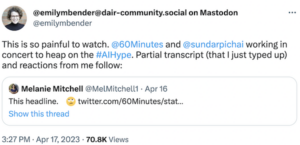[ad_1]

Has synthetic intelligence left the realm of fantasy to turn into a disruptor of actuality? Are AI fashions now studying and pondering on their very own, heralding the age of synthetic normal intelligence? When you caught final weekend’s “60 Minutes,” you would possibly assume so.
Within the April 16 episode, CBS host Scott Pelley interviewed Google CEO Sundar Pichai and different builders about new and rising AI know-how and the way forward for AI.
“In 2023 we realized {that a} machine taught itself the best way to converse to people like a peer, which is to say with creativity, fact, error, and lies,” Pelley says of AI chatbots, evaluating this second to the invention of fireside or invention of agriculture.
Pichai carries an optimistic but involved outlook and warns that “profound know-how” like Google’s chatbot, Bard, will “influence each product throughout each firm.”
Within the interview, Pichai acknowledges the speedy tempo of AI improvement and the challenges it presents, admitting that these considerations generally maintain him up at night time. He additionally acknowledges the know-how’s propensity for creating pretend information and pictures, saying, “On a societal scale, , it could actually trigger numerous hurt.”
Google launched Bard, considerably hesitantly, following Microsoft’s launch of a Bing search engine model that makes use of OpenAI’s giant language fashions, the identical know-how chargeable for the extensively identified ChatGPT. Google has to this point launched Bard with restricted capabilities, however Pichai mentions the corporate is reserving a extra highly effective Bard, pending extra testing.
Pelley: Is Bard secure for society?
Pichai: The best way we’ve got launched it at present, as an experiment in a restricted manner, I believe so. However all of us should be accountable in every step alongside the best way.
Narrator: Pichai advised us he is being accountable by holding again for extra testing, superior variations of Bard, that, he says, can cause, plan, and connect with web search.
Pelley: You’re letting this out slowly in order that society can get used to it?
Pichai: That is one a part of it. One half can also be in order that we get consumer suggestions. And we are able to develop extra strong security layers earlier than we construct, earlier than we deploy extra succesful fashions.

CBS “60 Minutes” host Scott Pelley interviews Google CEO Sundar Pichai about the way forward for AI. (Supply: CBS)
Chatbots like Bard and ChatGPT are liable to fabricating data whereas sounding utterly believable, one thing the 60 Minutes workforce witnessed firsthand when Google SVP of Expertise and Society James Manyika requested Bard about inflation in a demo. The chatbot really useful 5 books that don’t exist however sound like they may, just like the title “The Inflation Wars: A Fashionable Historical past” by Peter Temin. Temin is an precise MIT economist who research inflation and has written a number of books, simply not that one.
Narrator: This very human trait, error with confidence, known as, within the trade, hallucination.
Pelley: Are you getting numerous hallucinations?
Pichai: Sure, , which is predicted. Nobody within the area has but solved the hallucination issues. All fashions do have this as a problem.
Pelley: Is it a solvable drawback?
Pichai: It is a matter of intense debate. I believe we’ll make progress.
Some AI ethicists are involved, not solely with the hallucinations, however with how humanizing AI could also be problematic. Emily M. Bender is a professor of computational linguistics on the College of Washington, and in a Twitter thread turned blog post, she accuses CBS and Google of “peddling AI hype” on the present, calling it “painful to observe.”
Particularly, Bender’s put up highlights a section the place Bard’s “emergent properties” are mentioned: “Of the AI points we talked about, essentially the most mysterious known as emergent properties. Some AI methods are instructing themselves abilities that they weren’t anticipated to have. How this occurs will not be properly understood,” narrates Pelley.
 Through the present, Google provides the instance of considered one of its AI fashions that appeared to be taught Bengali, a language spoken in Bangladesh, all by itself after little prompting: “We found that with only a few quantities of prompting in Bengali, it could actually now translate all of Bengali. So now, rapidly, we now have a analysis effort the place we’re now attempting to get to a thousand languages,” mentioned Manyika within the section.
Through the present, Google provides the instance of considered one of its AI fashions that appeared to be taught Bengali, a language spoken in Bangladesh, all by itself after little prompting: “We found that with only a few quantities of prompting in Bengali, it could actually now translate all of Bengali. So now, rapidly, we now have a analysis effort the place we’re now attempting to get to a thousand languages,” mentioned Manyika within the section.
Bender calls the concept of its translating “all of Bengali” disingenuous, asking how it could even be potential to check the declare. She factors to a different Twitter thread from AI researcher Margaret Mitchell who asserts that Google is selecting to stay blind to the complete scope of the mannequin’s coaching information, asking, “So how may it’s that Google execs are making it appear to be their system ‘magically’ realized Bengali, when it most probably was skilled on Bengali?” Mitchell says she suspects the corporate actually doesn’t perceive the way it works and is incentivized to not.
Pichai: There’s a facet of this which we call– all of us within the area name it a “black field.” You realize, you do not absolutely perceive. And you may’t fairly inform why it mentioned this, or why it bought fallacious. We’ve some concepts, and our capability to know this will get higher over time. However that is the place the state-of-the-art is.
Pelley: “You don’t absolutely perceive the way it works, and but you’ve turned it unfastened on society?”
Pichai: “Let me put it this fashion: I don’t assume we absolutely perceive how a human thoughts works, both.”
Bender calls Pichai’s reference to the human thoughts a “rhetorical sleight of hand,” saying, “Why would our (I assume, scientific) understanding of human psychology or neurobiology be related right here? The reporter requested why an organization can be releasing methods it doesn’t perceive. Are people one thing that corporations ‘flip unfastened’ on society? (After all not.)”
By inviting the viewer to “think about Bard as one thing like an individual, whose conduct we’ve got to stay with or possibly patiently prepare to be higher,” Bender asserts that Google is both evading accountability or hyping its AI system to be extra autonomous and succesful than it truly is.

(Source: Twitter)
Bender was co-author of a research paper that led to the 2020 firing of Mitchell and Timnit Gebru, co-leads of Google’s Moral AI workforce. The paper argues that larger will not be at all times higher in terms of giant language fashions, and the extra parameters on which they’re skilled, the extra clever they will seem, when in actuality, they’re “parrots” that don’t truly perceive language.
Within the interview, Pelley asks Pichai how Bard may convincingly focus on painful human feelings because it had throughout a demo the place it wrote a narrative concerning the loss of a kid: “How did it do all of these issues if it is simply attempting to determine what the subsequent proper phrase is?”
Pichai says the talk is ongoing, noting, “I’ve had these experiences speaking with Bard as properly. There are two views of this. You realize, there are a set of people that view this as, look, these are simply algorithms. They’re simply repeating what [they’ve] seen on-line. Then there’s the view the place these algorithms are displaying emergent properties, to be inventive, to cause, to plan, and so forth, proper? And personally, I believe we have to method this with humility.”
“Approaching this with humility would imply not placing out unscoped, untested methods and simply anticipating the world to deal. It might imply making an allowance for the wants and experiences of these your tech impacts,” wrote Bender.
We’ve reached out to Google and Emily Bender for remark and can replace the story as we be taught extra.
Associated
[ad_2]
Source link



